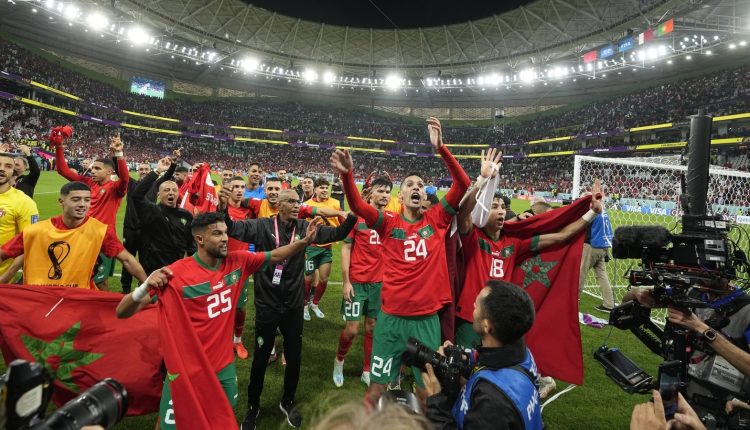After many false dawns, after the hand of Luis Suarez, it’s finally happened. An African team is the semi-finals of the World Cup. That it is a team from the Arab region in what has been called the Arab World Cup makes it extra special. All hail, Morocco.
Eight minutes stretched like an eternity before Facundo Tello blew the final whistle. Soon after, coach Walid Regragui was being lifted off the ground. Having played the last five minutes with 10 players after Walid Cheddira was sent off, Morocco players and staff then ran towards the stands to celebrate a 1-0 win against Portugal.
When the only goal happened, many stood in the media tribune their phones whipped out. Just being there wouldn’t be enough, this moment had to be recorded for posterity. Morocco’s red shirts huddled near the touchline, their celebrations amplified by those in the stands to the point that it threatened to shake the Al Thumama Stadium off its moorings.
That is what Youssef En-Nesyri’s goal meant to Morocco and to the Arab world at large. Diogo Costa fluffed his lines in the Portugal goal unable to collect Yahia Attiyat Allah’s delivery from the left. It left Ruben Dias sandwiched between the goalkeeper and En-Nesyri who leapt highest to conquer with a header.
Morocco were leading 43 minutes into a World Cup quarter-final against former European champions and their all-stars team that could afford to leave Cristiano Ronaldo on the bench. It was incredible, it was true and it had the stadium bouncing. Ten minutes from time and the scoreline staying that way despite Ronaldo coming on in the 51st minute and Portugal coach Fernando Santos looking more lugubrious than usual meant that the media tribune had become a part of the general stands. They were also counting down the clock, Deadlines, what deadlines?
Portugal threw lock, stock and Ronaldo at Morocco and, unlike Spain, didn’t always go sideways. But stubborn in their refusal to yield, Morocco thwarted them. Yassine Bounou, their goalkeeper with filmstar looks and a sunny disposition, was excellent again. He got a hand to tip over Joao Felix’s curler after Ronaldo set him up. He was there when Bruno Fernandes tried to find Ronaldo, cutting off the delivery and bent down to keep out a Ronaldo drive in stoppage time. And when Felix had tried a flying header in the third minute, it was Bounou who denied him a spectacular goal. When Pepe’s header missed the mark, Bounou smiled.
After his heroics against Spain, Bounou, who was born in Montreal and plays in Spain, making his story a part of the Moroccan diaspora that played an important role in the first African team in a World Cup semi-final, again led from the back. Morocco had only 27% possession, showing not for the first time in this competition that possession is not everything in international football. If anything, on the break, Morocco could have increased the margin. It would have happened in the 81st minute had Pepe not been able to deny Cheddira.
Morocco had injuries to deal with. Nayef Aguerd and Noussair Mazraoui were not available but typifying the spirit that courses through this team, Romain Saiss started despite having played the last few minutes against Spain with a heavy strapping. It was 57 minutes before Sais realised he couldn’t play any longer and was replaced by Achraf Dari.
There are around 15000 Moroccans in Doha. Approximately around 20,000 had travelled for this game and with the rest of the Arab world throwing its weight behind the team, it meant that Morocco could match Argentina for support here. Imagine what the atmosphere would be should they meet in the final. Improbable? This team has been showing that the word means nothing to them.
Regragui has forged a team where though Hakim Ziyech is more equal than others, it doesn’t matter. The argument about using players only born in Morocco too has been buried by this squad that has 14 who were not. Instead, this team has forged a connection among Moroccans all over the world.
It has also sent out a message that African coaches can hold their own at this level. It is something Regragui, who lived in France and was born there, feels strongly about. Clubs like Barcelona and Manchester City don’t thin Arab coaches are worthy, he has said. They still won’t but with no foreign coaches in five Africa teams coming at the World Cup start has been made. One Regragui has taken to a different level with Atlas Lions, who are now the pride of Moroccos, Africa and the Arab world.


